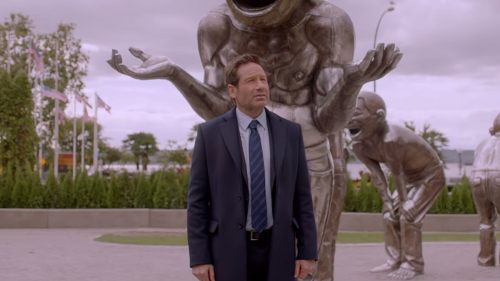THE X-FILES, 25 Years Later: We Still Want To Believe
Do you remember where you were when The X-Files premiered? Like many of us, you might not have been paying attention on September 10, 1993, and only tuned in to the show when word of mouth began to suggest that this new FOX show might be worth watching.
You see, back in the old days (sits down in rocking chair), we didn’t hear about things five seconds after they took place. The internet had only just become “a thing” and social media wasn’t yet a gleam in the eye of Mark Zuckerberg (though he was nine years old at the time, so who knows). TV Guide was delivered to mailboxes every week, but there wasn’t an exhaustive stream of entertainment news media, so news didn’t travel quite as fast.
That was all about to change, however, as the popularity and reach of The X-Files grew in tandem with that of the internet, a perfect instance of different types of electronic media influencing each other. For example, if you were an early adopter to either the show or the ‘net, you’ll know about The Gillian Anderson Testosterone Brigade and The David Duchovny Estrogen Brigade. Although “shipping” wasn’t invented for Special Agents Fox Mulder and Dana Scully, The X-Files played an important role in bringing that practice out of the shadows of Star Trek fandom and into more mainstream acceptability. But that wasn’t the only way that The X-Files impacted television.
To refer to The X-Files as just another crime procedural is to do it a great disservice. The show began just a couple of years after the premiere of probably the best crime procedural of all time (and certainly the longest-running), Law & Order. While Dick Wolf’s biggest success was a show ostensibly devoted to “ripped from the headlines” plots, it’s impossible to deny that viewers also tuned in for the regular characters who represented two separate but equally important groups. Characters like Detective Mike Logan were so important, in fact, that they found their way onto spinoff series like Law & Order: Criminal Intent. Another spinoff series, Trial By Jury, was canceled not only due to low ratings and competition, but also to Jerry Orbach’s (Detective Lenny Briscoe) death. And so it was that the characters of Fox Mulder and Dana Scully became as important to the success of The X-Files as Briscoe and Logan, et. al were to Law & Order.
One thing that sets The X-Files apart from Law & Order is the former’s ongoing mythology. For example, while the trials and tribulations of Briscoe’s alcoholism and drug-addicted daughter were through lines during the latter’s 20-season run, X-Files creator Chris Carter kicked things up a few notches by throwing alien invasions and shadowy cabals into the mix. Even if the use of the word “mythology” to define “serialized story arcs” didn’t begin with The X-Files, it gained common usage around the mid-1990s, going on to be used in connection with later shows like Fringe and Lost.
The continual depictions of autopsies (both human and “alien”) on The X-Files, along with copious amounts of blood, ooze, and slime was likely a major inspiration for the CSI franchise and its fixation with showing murder victims’ corpses in unrelenting, grisly close-up. It’s also probably not a coincidence that Fox Mulder’s I WANT TO BELIEVE mantra gave rise to the proliferation of shows like Ancient Aliens and its ilk.
When ABC’s Lost premiered in 2004, TV audiences could definitely see the fruits of The X-Files’ labor. Although there was no dynamic duo to guide audiences through the often murky waters surrounding the island on which the survivors of Oceanic flight 815 resided, Lost’s mythology was as important to the show as any of its characters, perhaps even more so.
The X-Files had the Cigarette Smoking Man and The Syndicate; Lost had the smoke monster and The Others. Lost also examined the main characters’ backstories through flashbacks in a way that seemed beholden to The X-Files’ ongoing narrative about Mulder’s missing sister Samantha and the way that event was connected to the larger mythology.
In some ways, it was not just the sexual tension in the Mulder/Scully relationship that kept The X-Files going, it was also the tension between that narrative thread and the overarching mythology, one which became more and more convoluted as the seasons progressed. Lost took this idea and ran with it, with so many unanswered questions remaining at the end of its six-year run that many fans of the show took to the internet to complain.
Lost was a far more serious affair than The X-Files, a show that mocked itself gleefully and frequently, much like another X-Files inspired show, Supernatural. Premiering three years after the eighth season of The X-Files ended, Supernatural would transform Mulder and Scully into two demon-hunting brothers named Sam and Dean Winchester. It’s worth noting that Kim Manners, who directed some of The X-Files most well-loved episodes, went on to serve as both executive producer on Supernatural as well as the director of several episodes.
The connections between the two shows are obvious and immediate; in the show’s pilot, Sam and Dean introduce themselves as FBI agents named Mulder and Scully. Like The X-Files, there are “monster of the week” episodes on Supernatural along with a complex mythology that involves ghosts, demons, angels and other otherworldly creatures in much the same way that The X-Files uses aliens and government conspiracies. In the Supernatural episode called “Monster Movie” there’s even a bit where a character asks, “So, you guys are like Mulder and Scully or something, and the X-Files are real?” to which Dean replies, “No, The X-Files is a TV show. This is real.”
When The X-Files returned in 2016 for a six-episode “event series,” there were many references to the show’s impact, but this practice reached its apex with the ten episodes of season eleven that aired between January and March 2018. “The Lost Art of Forehead Sweat” is so metacritical, self-reflexive, and hilariously funny that it qualifies for a spot in the top three of the series’ best ever episodes. It’s an ideal example of when “fanon”, or fan-generated ideas, become canon, or material that is officially part of the story.
In “The Lost Art of Forehead Sweat” the parallel X-Files universe that was hinted at in earlier episodes of seasons ten and eleven (“My Struggle I - III”) is discussed outright, in the form of well, a parallel universe in which things like “The Mandela Effect” become “The Mengele Effect.” There is a shadowy cabal in its plot that’s the comic inverse of The Syndicate. It also includes ridiculous aliens, Mulder parodying himself, and all kinds of hilarious dialogue that must be seen to be appreciated fully. It may not be the grand finale of that season (that would be “My Struggle IV”), but it feels like the show finally comes full circle, much like that ouroboros tattoo on Scully’s back.
X-Files Chris Carter stated earlier this year that the season eleven finale was not intended to be the series finale, despite the fact that Gillian Anderson has insisted she is done with the show. Yet even if The X-Files is over for good (at least in the Mulder/Scully incarnation, anyway), its continued influence ensures that it will never really die. In other words, if you still want to believe, you can.



